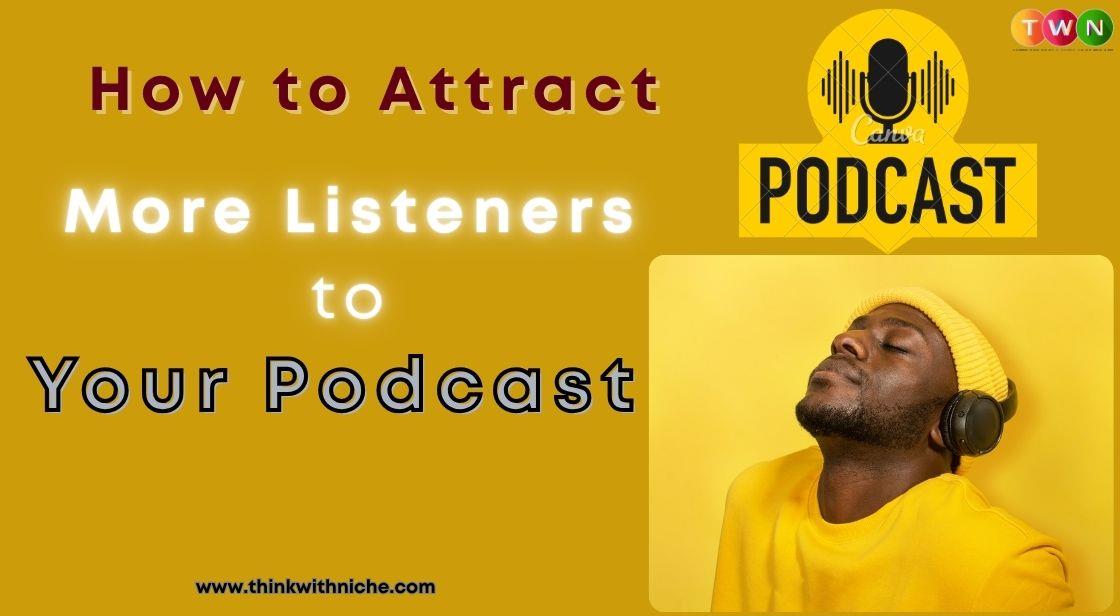How to Attract More Listeners to Your Podcast

Blog Post
Launching a podcast is an exciting journey. You pick a theme, set up your microphone, record your first episodes, and proudly publish them to the world. But soon after, many podcasters face a sobering reality: getting listeners is much harder than making episodes.
This leads to one of the most common questions in podcasting: “How can I attract more listeners to my podcast?” It’s a question that highlights the gap between being a creator and being a marketer.
The truth is, many successful podcasters aren’t necessarily the most talented hosts. Some of them have average content, yet they thrive because they understand marketing.
They know how to position their show, how to get discovered, and how to keep people coming back. Meanwhile, passionate podcasters—who genuinely love their craft—often struggle because they rely on talent alone without effective promotion strategies.
This can feel discouraging, but it doesn’t have to be. The beauty of podcasting is that you don’t need to be a marketing expert to grow your audience. By setting the right expectations and applying smart, listener-focused strategies, you can steadily attract more people who genuinely connect with your content.
In this guide, we’ll explore practical, proven ways to grow your podcast audience. From understanding how podcasts are discovered to leveraging search engines, AI, word-of-mouth, and even social media, you’ll learn how to position your show for long-term success.
Tips for Increasing Podcast Listeners
The Struggle Every Podcaster Faces
If you’ve ever started a podcast, you already know the excitement of hitting that record button for the first time. You pour your heart, effort, and creativity into crafting valuable episodes. But soon after publishing, reality sets in: getting people to actually listen is much harder than creating the show itself.
This leads to one of the most common questions among podcasters: “How do I attract more listeners to my podcast?”
The challenge comes from the fact that most podcasters are passionate creators, not marketers. They know how to deliver engaging conversations, share insights, and tell stories, but when it comes to marketing and growing an audience, many struggle. Meanwhile, some less-talented hosts manage to reach massive audiences—not because their shows are better but because they’re excellent marketers.
This can feel frustrating. But here’s the good news: you don’t need to be a marketing genius to grow your podcast. With the right mindset and strategies, you can steadily attract listeners who truly value your content.
This guide will break down practical and proven methods to grow your podcast audience, set realistic expectations, and position your show for long-term success.
Step One: Setting the Right Expectations About Podcast Growth
Before we dive into tactics, let’s address a crucial point: podcasts are not designed to go viral like social media posts.
On platforms like Instagram, TikTok, or Twitter, numbers dominate everything—followers, likes, shares. Success is often measured purely by scale. But podcasts are different. People listen to podcasts with intention—to learn, to be entertained, or to improve themselves.
That means 100 loyal podcast listeners are far more valuable than 10,000 passive social media impressions.
Think about it: if you were standing on a stage speaking to 100 people who showed up specifically to hear you, wouldn’t that feel meaningful? Now imagine those people coming back week after week. That’s the true value of podcasting.
Why Small Can Still Be Big
Most podcasters won’t reach millions of listeners, and that’s perfectly fine. The key is to understand that depth matters more than breadth. Your listeners are not just random scrollers—they are individuals who choose to spend time with you, often in intimate settings like commuting, working out, or relaxing at home.
Industry Data to Keep in Mind
To put things into perspective, here’s real data from a study of 15,791 independent podcasts:
-
If your episode gets 454 downloads in the first 7 days, you’re in the top 10%.
-
With 109 downloads, you’re already in the top 25%.
-
Just 27 downloads places you in the top 50%.
These numbers show that podcasting success doesn’t require millions of listeners. Even a few hundred dedicated fans put you ahead of thousands of other shows.
Also Read: How AI Voice Agents Are Transforming Startups in 2025
Step Two: Understanding Push vs. Pull Marketing
When thinking about podcast promotion, it’s useful to distinguish between push marketing and pull marketing.
-
Push Marketing: You actively push your show in front of people—posting links everywhere, running ads, or begging guests to share episodes. While this can bring quick wins, it’s often short-lived and exhausting.
-
Pull Marketing: You create content that naturally attracts your target audience by being easily discoverable and truly valuable. This method is slower but far more sustainable.
For long-term podcast growth, pull marketing is the smarter approach. It positions your show to be discovered by people already searching for the topics you cover.
Step Three: How People Discover Podcasts
Research and experience show that people usually discover new podcasts in three main ways:
-
Searching online or asking AI for recommendations
-
Receiving personal recommendations from friends, family, or networks
-
Engaging on social media (when used wisely)
Let’s break down each method in detail and see how you can leverage them.
1. Getting Discovered Through Search and AI
In the digital age, search is everything. Whether it’s Google, YouTube, Spotify search bars, or even AI tools like ChatGPT, people actively type queries to find content.
This is why search engine optimization (SEO) for podcasts is critical. If your podcast is optimized, it can show up when someone types, “Best podcasts on productivity” or “Top entrepreneurship podcasts.”
Strategies to Leverage Search and AI
-
Consistency Is King:
Publish regularly. Research suggests that shows with at least 100 episodes and a publishing frequency of 10 days or less capture the vast majority of independent podcast listenership. Regular uploads signal both to platforms and to your audience that your show is active and reliable. -
Optimize Your Metadata:
Use clear, keyword-rich titles and descriptions. For example, instead of naming your episode “Episode 12 – Special Guest,” use something like “How to Build a Business Without Investors – Interview with John Doe.” -
Write Strong Show Notes:
Don’t skip this step. Well-written episode notes with relevant keywords not only help search engines but also give potential listeners a reason to click “play.” -
Transcribe Your Episodes:
Uploading transcripts to your website or blog helps search engines index your content. Someone searching for a phrase you mentioned could land directly on your site. -
Use AI-Friendly Formats:
With tools like ChatGPT or voice assistants recommending podcasts, structuring your content clearly (with clear episode titles, summaries, and keywords) increases your chances of being recommended.
Pro Tip: Think of Google and AI as the world’s most powerful influencers. With billions of searches daily, being suggested by them is more impactful than relying on a single big-name guest to share your episode.
2. Growing Through Word-of-Mouth Recommendations
The second (and arguably most powerful) way podcasts grow is through personal recommendations. When people love your show, they share it. And word-of-mouth remains the most trusted form of marketing.
How to Make Your Podcast Worth Sharing
-
Deliver Transformational Value:
Ask yourself, “Is my podcast good enough that someone would text it to a friend?” Make each episode so valuable or entertaining that listeners feel compelled to spread the word. -
Improve Your Communication Skills:
Practice speaking clearly, with energy and structure. Avoid filler words and long, rambling segments. -
Focus on Audio and Production Quality:
Poor sound quality can instantly turn off new listeners. Invest in a decent microphone and basic editing. If you record video, ensure it’s clear and professional. -
Be Intentional With Episode Structure:
Every episode should have a clear theme and deliver on its promise. Don’t add fluff—respect your listeners’ time. -
Engage With Your Listeners:
Respond to emails, comments, and messages. Create polls or Q&A sessions. The stronger your relationship with your audience, the more likely they’ll recommend you.
Example: If your podcast teaches time management strategies, imagine a listener who applies your tips and gets real results. They’re far more likely to tell their coworker, “You need to listen to this show.”
3. Using Social Media Wisely
Most podcasters look to social media first to promote their show. But here’s the truth: if you use social media as push marketing, it often wastes time and leads to frustration.
The trick is to use it for pull marketing—not by posting endlessly, but by joining existing conversations.
Smart Ways to Use Social Media for Podcast Growth
-
Join Niche Discussions:
Instead of broadcasting links, find online groups, threads, or discussions related to your niche. Add genuine value to the conversation, then share your episode as a helpful resource. -
Post Engaging Snippets:
Share short clips, behind-the-scenes content, or powerful quotes from your episodes. These can spark curiosity and drive people to listen. -
Engage, Don’t Spam:
Comment on others’ posts, ask questions, and interact authentically. This builds trust, and once people know you, they’ll be more open to checking out your podcast. -
Set Small Goals:
Aim to find just one new listener a day through social media. Over a year, that’s 365 new loyal listeners.
Additional Strategies to Consider
While search, recommendations, and social media are the three big pillars, here are a few more tactics to boost growth:
-
Cross-Promotion: Partner with other podcasters in your niche and swap guest appearances or promo ads.
-
Email Newsletters: Build a mailing list to notify subscribers about new episodes and share bonus content.
-
Community Building: Create a private group (Discord, Slack, or Facebook) where listeners can interact with you and each other.
-
Guesting on Other Podcasts: Appear on established shows in your niche to introduce yourself to new audiences.
Conclusion: Focus on Long-Term Value, Not Vanity Metrics
Attracting more listeners to your podcast is not about chasing viral success or gaming algorithms. It’s about:
-
Making your show discoverable through search and AI.
-
Delivering content worth sharing.
-
Using social media intentionally, not wastefully.
Podcasting is a long game. Numbers may grow slowly, but what you’re building is trust, loyalty, and impact. Even if you have just 200 loyal listeners, that’s 200 people who choose to spend their time with you consistently—a powerful and rare achievement in today’s distraction-filled world.
So instead of asking, “How do I get millions of listeners?” ask, “How do I create something so valuable that even one new listener feels compelled to return and share it?”
That shift in mindset is the real secret to podcast growth.
You May Like
EDITOR’S CHOICE












